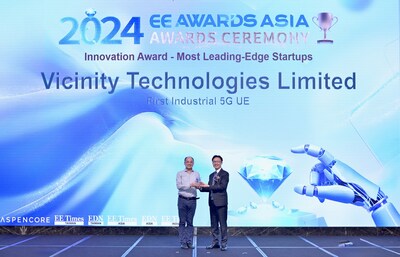TAIPEI, /PRNewswire/ -- Based in Bristol, UK, Vicinity Technologies Ltd is a leading provider of innovative wireless communications products, with a focus on 5G networks and infrastructure. With over 30 patents, the company has full R&D capabilities for designing, developing, verifying, and deploying complete base-stations, O-RAN architecture products, and 5G core network solutions for private networks and rural deployments.
Its flagship product, the First Industrial 5G UE, exemplifies the company's commitment to pushing the boundaries of what is possible in 5G technology.
"We are recognized for our ability to deliver ultra-low latency, precision timing, and high synchronization performance, which are critical for industrial applications such as automation, robotics, and real-time monitoring," says Vicinity CEO Eric during an interview with EE Times Asia.
Eric says the company builds 5G fiber networks that they can customize to customers' specific use cases or requirements. For example, in the industrial sector, Vicinity can provide a very low latency, high throughput, and very fast response network that is critical for synchronizing mobile robots.
"Our competence is more on the development of the software side of the 5G infrastructure, so we can build, develop, and customize the features of fiber 5G networks and fully integrate them with the application requirements of customers," says Eric.
The company has partnered with a lot of Taiwanese ODMs who manufacture basestations in different ways and modes.
"For example, in the sub-6GHz region, the millimeter wave region [mmWave], and even for the NTN region, we have worked with all these Taiwanese manufacturers to develop the basestation products," says Eric. "And we are pretty successful because some of these vendors have already started engaging with mobile operators and are now having a lot of testing and deployment in different operator regions."
At the EE Awards Asia 2024, Vicinity received the Most Leading-Edge Startups award. Now in its fourth year, EE Awards Asia celebrates the contributions of Asia's engineering community over the past year.
"Thank you for the recognition," says Eric. "It is an honor to receive the Most Leading-Edge Startups Award from EE Times Taiwan. Our award-winning product, the First Industrial 5G UE, was developed with the goal of addressing several key challenges in the industrial communication landscape. As industries shift towards automation, digital transformation, and smart manufacturing, reliable, high-performance wireless communication is becoming a critical enabler. Traditional networks simply cannot meet the stringent demands of modern industrial applications, and this is where our solution comes in."
Eric says the award represents a significant milestone in the company's journey and is a testament to the innovation and dedication of their entire team. "This recognition not only validates the hard work we've put into developing the First Industrial 5G UE, but it also underscores the relevance and impact of our solutions in the rapidly evolving 5G ecosystem. The award highlights the importance of industrial 5G technology, particularly in sectors where real-time communication, ultra-low latency, and reliability are critical for driving efficiency and innovation. Being recognized at this level affirms that our vision of enabling next-generation industrial applications—such as factory automation, robotics, and advanced manufacturing—is resonating with both industry experts and customers alike."
Addressing Key Industry Challenges
According to Eric, one of the key challenges that Vicinity is trying to address is the need for ultra-low latency and high synchronization in industrial environments.
"Applications like robotics, machine-to-machine communication, and real-time control systems require almost instantaneous data transmission with minimal jitter. Our 5G UE is designed to deliver latency as low as 1ms and clock synchronization accuracy under 2µs, ensuring precise and reliable performance in time-sensitive operations. This level of precision is crucial for industries that rely on real-time monitoring and control, where even the slightest delay could lead to inefficiencies or safety risks."
Another key challenge is the inflexibility of traditional, fixed hardware solutions. Based on software-defined radio (SDR) architecture, Vicinity's wireless products allow for greater flexibility and customization.
"This means our solution can easily adapt to the unique requirements of different industries, whether it's manufacturing, logistics, healthcare, or energy. As a result, customers can deploy our UE across a wide range of use cases without being locked into a rigid, one-size-fits-all approach," explains Eric. "Furthermore, our solution directly tackles the issue of seamless integration with Industrial IoT [IIoT] devices. Many companies struggle with integrating legacy systems with newer, more advanced technologies. Our UE is designed to work seamlessly with existing IIoT infrastructures, making the transition to a 5G-enabled system as smooth and efficient as possible. This is especially important as industries look to leverage data-driven decision-making and automation.
Looking Ahead
The future of 5G in Asia is incredibly promising, with vast potential across multiple sectors, from manufacturing and logistics to healthcare and smart cities. As the region continues to be a global leader in technology adoption, we see 5G as a driving force behind the next wave of industrial transformation.
"In particular, 5G will play a critical role in enabling real-time communication, automation, and the seamless integration of advanced technologies like AI and IoT across industries," says Eric. "However, despite the excitement around 5G, there are still significant challenges that need to be addressed. One of the main hurdles is the high cost of infrastructure deployment, especially in rural and remote areas. The complexity of integrating 5G with existing networks also poses a challenge for many operators and industries. Additionally, ensuring secure and reliable connectivity in mission-critical applications remains a key concern as more businesses and governments rely on 5G for their operations."
Nevertheless, the opportunities are abundant, especially as industries digitize and automation becomes more widespread—driving the demand for low-latency, high-reliability communications.
"In Asia, sectors such as manufacturing, energy, and healthcare stand to benefit immensely from 5G's capabilities. Moreover, the rise of smart cities across the region presents a huge opportunity for 5G to enhance urban life through applications like intelligent transportation, real-time surveillance, and connected infrastructure," says Eric. "At Vicinity, we are focused on addressing these challenges and unlocking the potential of 5G in Asia by developing solutions that meet the unique needs of industrial customers. We believe that as the ecosystem matures, the benefits of 5G will become more accessible, and we will see widespread adoption that transforms industries and economies across the region."
View original content to download multimedia: https://www.prnewswire.com/news-releases/vicinity-pushing-the-boundaries-of-5g-302333196.html
SOURCE EE Times Asia






